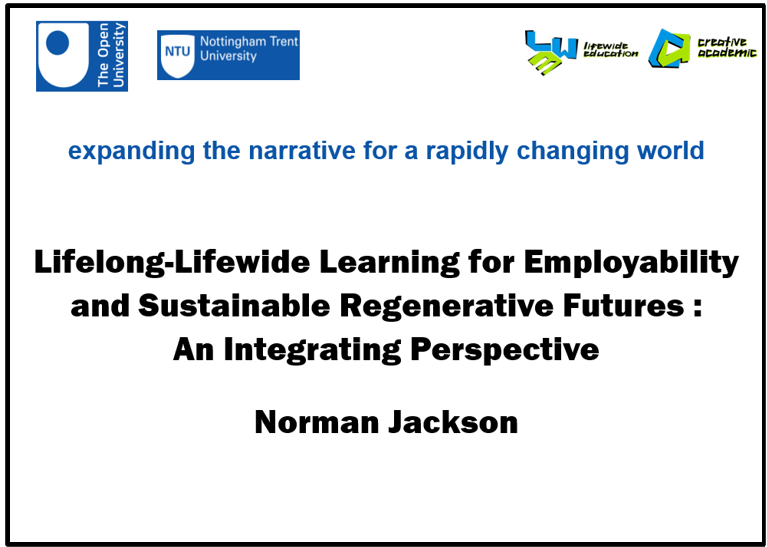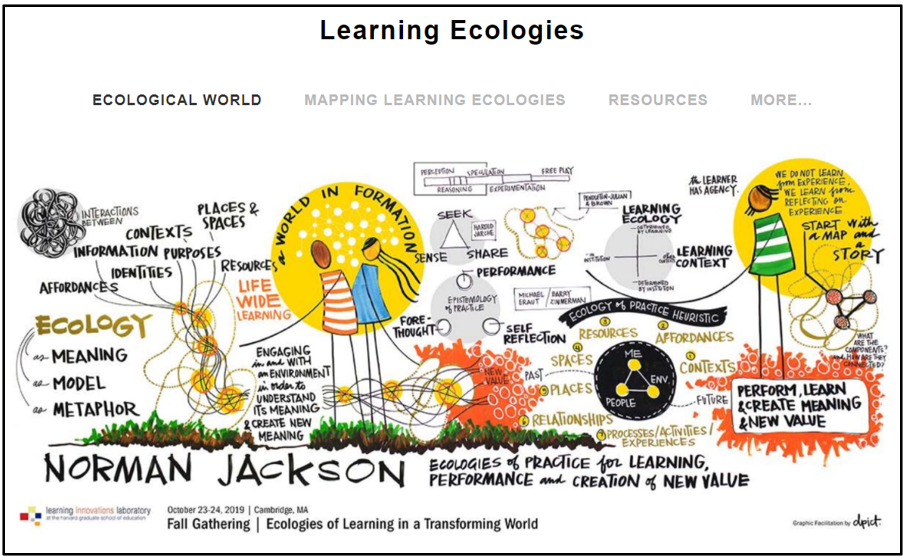OU EMPLOYABILITY CONFERENCE MARCH 2022
https://www.open.ac.uk/employability-conference/
Articulating employability so that it challenges the common discourse around work and skills, while emphasising the broad motivations for why people take up academic study and how it benefits them, is a big barrier for HEIs. Their task is made harder by the increasingly competitive business world they operate in and the measures that seemingly shape and constrain creative approaches to employability. How can HEIs respond to these issues? Does widening the narrative better prepare students for the future of work?
https://www.open.ac.uk/employability-conference/
Articulating employability so that it challenges the common discourse around work and skills, while emphasising the broad motivations for why people take up academic study and how it benefits them, is a big barrier for HEIs. Their task is made harder by the increasingly competitive business world they operate in and the measures that seemingly shape and constrain creative approaches to employability. How can HEIs respond to these issues? Does widening the narrative better prepare students for the future of work?
|
Lifelong-Lifewide Learning for Employability and Sustainable Regenerative Futures: An Integrating Perspective
Norman Jackson The contemporary world obliges human beings to learn and to keep on learning throughout their long lives in order to survive and flourish. The challenge of preparing learners for a lifetime of economic productivity and prosperity is significant. But this challenge is nested within the bigger concern of developing learners for an unknowable distant future 30 to 50 years from now that contains an existential risk. For we have reached a turning point in our history where not only do we have to learn for our own survival, wellbeing and economic prosperity, we also have to learn for and contribute to the health and vitality of our planet - “learning for oneself, for others and for the planet….. ”.(1 p.14) |
Powerpoint & Narrative
| ||||||||||||||
Employability is an important strand of sustaining self and a contributor to the motivational and psychological forces that give meaning to a life well lived (2). But it is not the only developmental strand, and enabling learners to develop the knowledge, skills, attitudes, values and experiences they need to gain employment, while necessary, is not enough. To lay the foundations for sustaining ourselves and the world in the more distant future, we need an experience-based curriculum that engages with the ontological dimension of being human - our undergoing in a world in continuous formation (3) - a world in which everything is connected and interdependent.
This passage from a Foresight Report, captures the importance of developing people as whole human beings who are able to connect to and interact with the world as they and it form. “Higher education institutions need to strike a balance between helping learners enter the current job market while at the same time helping them lay the foundation for ‘future readiness’. Future readiness focuses on helping people develop uniquely human aptitudes and practice resilience rather than on training them for specific jobs or skills…. The core of the foundation for readiness [for the future] lies in developing a strong inner self that is resilient, reflective, and able to see, develop and value positive connections and relationships [with the world].”(4)
This passage from a Foresight Report, captures the importance of developing people as whole human beings who are able to connect to and interact with the world as they and it form. “Higher education institutions need to strike a balance between helping learners enter the current job market while at the same time helping them lay the foundation for ‘future readiness’. Future readiness focuses on helping people develop uniquely human aptitudes and practice resilience rather than on training them for specific jobs or skills…. The core of the foundation for readiness [for the future] lies in developing a strong inner self that is resilient, reflective, and able to see, develop and value positive connections and relationships [with the world].”(4)
|
In the spirit of expanding employability narratives to embrace more distant futures in a fragile and currently unsustainable world, I will try to offer an integrating perspective based on the idea that we are ecological beings enacting life within and with an ecological world of relationships. connectivity and interdependency. If we are to succeed in ‘learning for sustainable regenerative futures’, we need a vision and concept of lifelong learning, education and employability that embraces consciously and explicitly the lifewide dimensions of learning in everyday life and its fundamentally ecological character.(5)
. |
Sources
1 UNESCO (2020). Embracing a culture of lifelong learning: Contribution to the Futures of Education initiative Report. A transdisciplinary expert consultation UNESCO Institute for Lifelong Learning: Paris Retrieved from https://www.sdg4education2030.org/embracing-culture-lifelong-learning-uil-september-2020
2 Alderfer, C. P. (1969) An empirical test of a new theory of human needs. Organizational Behaviour & Human Performance. Vol 4(2), 142-17
3 Barnett, R. (2004). Learning for an unknown future. Higher Education Research and Development v23 #3 247-260
4 Prince, K., Saveri, A. & Swanson, J. (2017). The Future of Learning, Redefining Readiness from the Inside Out Knowledge Works Forecast 4.0 Available at: https://knowledgeworks.org/resources/future-learning-redefining-readiness/
5 Jackson, N. J. (in press) Steps to an Ecology of Lifelong-Lifewide Learning for Sustainable, Regenerative and Thrivable Futures. In K. Evans, W. O. Lee, J. Markowitsch and M. Zukas (Eds) Third International Handbook of Lifelong Learning Springer
1 UNESCO (2020). Embracing a culture of lifelong learning: Contribution to the Futures of Education initiative Report. A transdisciplinary expert consultation UNESCO Institute for Lifelong Learning: Paris Retrieved from https://www.sdg4education2030.org/embracing-culture-lifelong-learning-uil-september-2020
2 Alderfer, C. P. (1969) An empirical test of a new theory of human needs. Organizational Behaviour & Human Performance. Vol 4(2), 142-17
3 Barnett, R. (2004). Learning for an unknown future. Higher Education Research and Development v23 #3 247-260
4 Prince, K., Saveri, A. & Swanson, J. (2017). The Future of Learning, Redefining Readiness from the Inside Out Knowledge Works Forecast 4.0 Available at: https://knowledgeworks.org/resources/future-learning-redefining-readiness/
5 Jackson, N. J. (in press) Steps to an Ecology of Lifelong-Lifewide Learning for Sustainable, Regenerative and Thrivable Futures. In K. Evans, W. O. Lee, J. Markowitsch and M. Zukas (Eds) Third International Handbook of Lifelong Learning Springer


